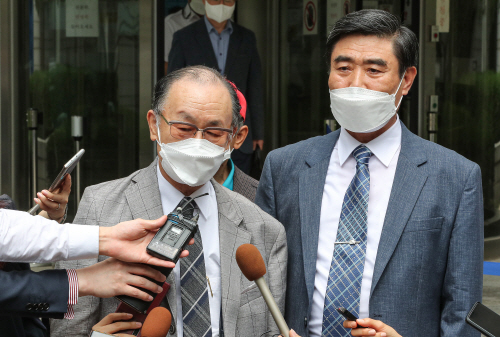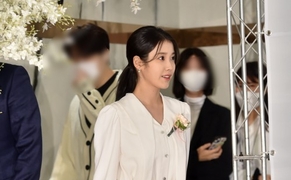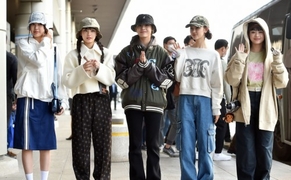 |
| Representatives of South Korean wartime forced laborers speak to reporters at the Seoul Central District Court on June 7, 2021, as the court dismissed their damages suit against Japanese companies./ Source: Yonhap |
AsiaToday reporters Lee Min-young & Kim Ye-seul
A local court on Monday rejected a damages suit launched by victims of wartime forced labor in Japan and their families against 16 Japanese companies. The latest ruling is in a contrast to the country’s top court ruling in 2018, which ruled in favor of forced labor victims.
The Seoul Central District Court dismissed the damages suit filed by a total of 84 South Korean victims of wartime forced labor in Japan and their families against 16 Japanese companies, including Nippon Steel & Sumitomo Meal Corp., Nissan Chemical Corp. and Mitsubishi Heavy Industries Ltd. The dismissal is a decision made without any trial due to the absence of litigation requirements, equivalent to a ruling against the plaintiffs.
The court ruled that the individual right to damages cannot be seen as being terminated or waived, but it said the individual right cannot be exercised through lawsuits due to the 1965 South Korea-Japan treaty. It said forced labor victims’ individual compensation rights are covered by the Korea-Japan treaty considering treaty-related documents, the circumstances leading to the treaty, purported intentions of the concerned parties, and their follow-up measures.
The court said that while their individual rights to damage claims may not be precluded by the 1965 bilateral agreement, their right to pursue legal proceedings is limited by it.
The latest ruling is in sharp contrast to the country’s Supreme Court ruling in October 2018, which upheld an appeals court ruling in 2013 that ordered Nippon Steel to pay each of the four South Korean forced labor victims, including the late Yeo Woon-taek.
Both South Korea and Japan share a common opinion that the individual claims have not been terminated referring to the 1965 agreement between them. However, various interpretations have been raised between them as to whether the individual rights can be exercised in accordance with the procedural laws.
After the court ruling, lawyers for the plaintiffs criticized the ruling as “very unfair” and vowed to appeal. “Today’s ruling runs directly counter to a previous Supreme Court ruling,” said a representative of the victims.
The victims’ side also criticized the court’s sudden decision to advance the schedule of the sentence hearing, which had been originally planned for Thursday.
Lim Cheol-ho, a plaintiff whose father was allegedly conscripted to work in Japan, said the court ruling is “pathetic.” “Is the judge a Korean national? Is it a Korean court? The ruling is deplorable,” Lim said.
#court #Japan #ruling #forced labor #dismissal
Copyright by Asiatoday
Most Read
-
1
-
2
-
3
-
4
-
5
-
6
-
7





















